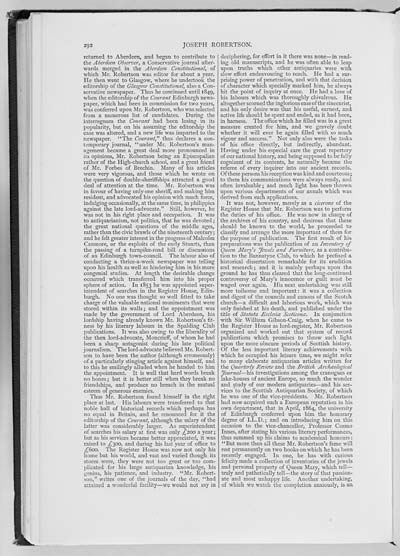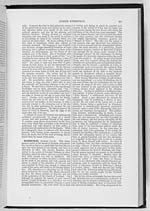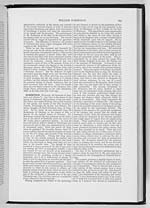292
returned to Aberdeen, and began to contribute to
the Aberdeen Observer, a Conservative journal after-
wards merged in the Aberdeen Constitutional, of
which Mr. Robertson was editor for about a year.
He then went to Glasgow, where he undertook the
editorship of the Glasgow Constitutional, also a Con-
servative newspaper. Thus he continued until 1849,
when the editorship of the Courant Edinburgh news-
paper, which had been in commission for two years,
was conferred upon Mr. Robertson, who was selected
from a numerous list of candidates. During the
interregnum the Courant had been losing in its
popularity, but on his assuming the editorship the
case was altered, and a new life was imparted to the
newspaper. "The Courant" thus declares a con-
temporary journal, "under Mr. Robertson's man-
agement became a great deal more pronounced in
its opinions, Mr. Robertson being an Episcopalian
rather of the High-church school, and a great friend
of Mr. Forbes of Brechin. Many of his articles
were very vigorous, and those which he wrote on
the question of double-sheriffships attracted a good
deal of attention at the time. Mr. Robertson was
in favour of having only one sheriff, and making him
resident, and advocated his opinion with much force,
indulging occasionally, at the same time, in philippics
against the late lord-advocate." Still, however, he
was not in his right place and occupation. It was
to antiquarianism, not politics, that he was devoted;
the great national questions of the middle ages,
rather than the civic brawls of the nineteenth century;
and he felt greater interest in the progress of Malcolm
Canmore, or the exploits of the early Stuarts, than
the passing of a turnpike-road bill or discussions
of an Edinburgh town-council. The labour also of
conducting a thrice-a-week newspaper was telling
upon his health as well as hindering him in his more
congenial studies. At length the desirable change
occurred which transferred him into his proper
sphere of action. In 1853 he was appointed super-
intendent of searches in the Register House, Edin-
burgh. No one was thought so well fitted to take
charge of the valuable national muniments that were
stored within its walls; and the appointment was
made by the government of Lord Aberdeen, his
lordship having already known Mr. Robertson's fit-
ness by his literary labours in the Spalding Club
publications. It was also owing to the liberality of
the then lord-advocate, Moncrieff, of whom he had
been a sharp antagonist during his late political
journalism. The lord-advocate believed Mr. Robert-
son to have been the author (although erroneously)
of a particularly stinging article against himself, and
to this he smilingly alluded when he handed to him
the appointment. It is well that hard words break
no bones; but it is better still when they break no
friendships, and produce no breach in the mutual
esteem of generous enemies.
Thus Mr. Robertson found himself in the right
place at last. His labours were transferred to that
noble hall of historical records which perhaps has
no equal in Britain, and he renounced for it the
editorship of the Courant, although the salary of the
latter was considerably larger. As superintendent
of searches his salary at first was only �200 a year;
but as his services became better appreciated, it was
raised to �300, and during his last year of office to
�600. The Register House was now not only his
home but his world, and vast and varied though its
stores were, they were not too great or too com-
plicated for his large antiquarian knowledge, his
genius, his patience, and industry. "Mr. Robert-
son," writes one of the journals of the day, "had
attained a wonderful facility�we would not say in
deciphering, for effort in it there was none�in read-
ing old manuscripts, and he was often able to leap
upon truths which other antiquaries were with
slow effort endeavouring to reach. He had a sur-
prising power of penetration, and with that decision
of character which specially marked him, he always
hit the point of inquiry at once. He had a love of
his labours which was thoroughly chivalrous. He
altogether scorned the inglorious ease of the sinecurist,
and his only desire was that his useful, earnest, and
active life should be spent and ended, as it had been,
in harness. The office which he filled was in a great
measure created for him, and we gravely doubt
whether it will ever be again filled with so much
vigour and success." Not only also were the tasks
of his office directly, but indirectly, abundant.
Having under his especial care the great repertory
of our national history, and being supposed to be fully
cognizant of its contents, he naturally became the
referee of every inquirer into our ancient records.
Of these persons his reception was kind and courteous;
to them his communications were always ready, and
often invaluable; and much light has been thrown
upon various departments of our annals which was
derived from such applications.
It was not, however, merely as a cicerone of the
Register House that Mr. Robertson was to perform
the duties of his office. He was now in charge of
the archives of his country, and desirous that these
should be known to the world, he proceeded to
classify and arrange the more important of them for
the purpose of publication. The first result of his
preparations was the publication of an Inventory of
Queen Mary's Jewels and Furniture, as a contribu-
tion to the Bannatyne Club, to which he prefixed a
historical dissertation remarkable for its erudition
and research; and it is mainly perhaps upon the
ground he has thus cleared that the long-continued
controversy of Mary's innocence or guilt must be
waged over again. His next undertaking was still
more toilsome and important: it was a collection
and digest of the councils and canons of the Scotch
church�a difficult and laborious work, which was
only finished at his death, and published under the
title of Statuta Ecclesi� Scoticon�. In conjunction
with Sir William Gibson-Craig, when he came to
the Register House as lord-register, Mr. Robertson
organized and worked out that system of record
publications which promises to throw such light
upon the more obscure periods of Scottish history.
Of the less important literary achievements with
which he occupied his leisure time, we might refer
to many elaborate antiquarian articles written for
the Quarterly Review and the British Arch�ological
Journal�his investigations among the cranogues or
lake-houses of ancient Europe, so much the wonder
and study of our modern antiquaries�and his ser-
vices to the Scottish Antiquarian Society, of which
he was one of the vice-presidents. Mr. Robertson
had now acquired such a European reputation in his
own department, that in April, 1864, the university
of Edinburgh conferred upon him the honorary
degree of LL. D.; and on introducing him on this
occasion to the vice-chancellor, Professor Cosmo
Innes, after stating his various literary performances,
thus summed up his claims to academical honours:
"But more than all these Mr. Robertson's fame will
rest permanently on two books on which he has been
recently engaged. In one, he has with curious
felicity made a collection of inventories of the jewels
and personal property of Queen Mary, which tell�
truly and pathetically tell�the story of that passion-
ate and most unhappy life. Another undertaking,
of which we watch the completion anxiously, is an

![]() Universal Viewer |
Universal Viewer | ![]() Mirador |
Large image | Transcription
Mirador |
Large image | Transcription
![]()

